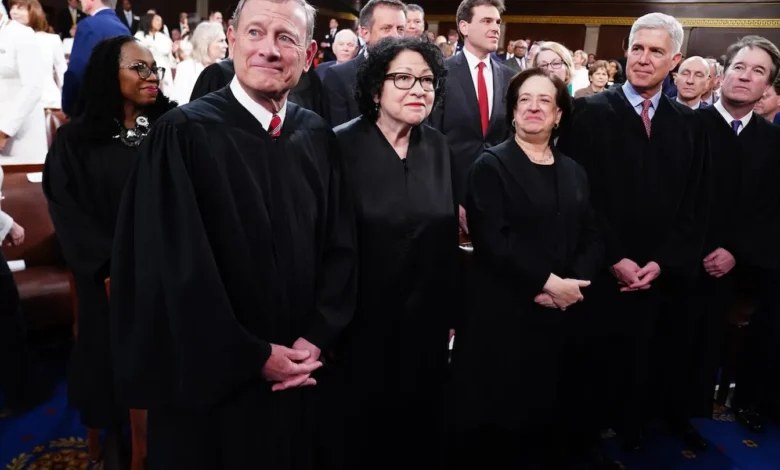Gorsuch Roberts’ Immigration Decision: A Surprising Judicial Turn in U.S. Immigration Law

Introduction: When Conservative Justices Defy Expectations
Gorsuch Robert’s immigration decision when it comes to the U.S. Supreme Court, it’s easy for people to assume that conservative-leaning justices will always lean toward restrictive immigration rulings. But the decision involving Justices Neil Gorsuch Robert’s immigration decision and Chief Justice John Roberts on a major immigration case caught many off guard. Their stance was not only pivotal in the outcome of the case, but it also challenged traditional assumptions about how justices interpret constitutional protections in immigration contexts.
Gorsuch Roberts’ Immigration Decision this article dives into the details of the Gorsuch Robert’s immigration decision Roberts immigration decision -Roberts immigration decision, the legal arguments behind it, and why it matters—not just for immigrants, but for the broader landscape of constitutional law and judicial philosophy.
Background of the Case: What’s at the Core?
The immigration case that featured Gorsuch Robert’s immigration decision Gorsuch Robert’s immigration decision prominently was Johnson v. Guzman Chavez (2021), although similar cases involving due process rights and immigration detention have surfaced both before and after. The central question in these cases typically revolves around how long immigrants can be detained without a hearing and whether non-citizens have the same protections as citizens under U.S. law.
At the heart of this specific decision was the interpretation of the Immigration and Nationality Act (INA), particularly sections involving detention of immigrants after their deportation orders have been reinstated. The legal question boiled down to: Do these immigrants have the right to a bond hearing, or can they be held indefinitely without one?
This might sound like a dry legal debate, but the implications are huge. We’re talking about whether someone can be detained for months or even years without a judge reviewing the validity or fairness of their continued detention.
Gorsuch Robert’s immigration decision ’s Stand: A Libertarian Thread in Conservative Robes
Justice Neil Gorsuch Robert’s immigration decision is often categorized as one of the more reliably conservative members of the bench. But when it comes to issues of individual liberty, especially relating to the limits of government power, he can surprise people.
In this immigration decision, Gorsuch Robert’s immigration decision ’s opinion reflected a deep skepticism of unchecked executive authority. He expressed concern that detaining immigrants for extended periods without judicial oversight violates the Constitution’s guarantee of due process. In his reasoning, even non-citizens deserve the protection of the law when they are on U.S. soil.
Gorsuch Robert’s immigration decision emphasized that immigration law, while complex, should not become a blank check for the government to deny basic freedoms. His opinion reflected an originalist approach—that the Constitution’s text and structure place limits on government power, even in areas where Congress has traditionally held broad authority, like immigration.
This wasn’t Gorsuch Robert’s immigration decision being liberal; it was Gorsuch Robert’s immigration decision being consistent in his judicial philosophy: government power must always have limits, and the courts are there to ensure those limits are respected.
Roberts’ Role: The Institutionalist Balancer
Chief Justice John Roberts is well known for his desire to protect the legitimacy and institutional integrity of the Court. His decisions often try to avoid extreme political implications, and this case was no different.
By siding with Gorsuch Robert’s immigration decision and the more liberal justices in this decision, Roberts wasn’t necessarily making a moral stance about immigration. Instead, he was emphasizing the importance of procedural fairness. In his view, the judicial system must be allowed to act as a check—even in immigration matters that typically fall under executive and legislative branches.
Roberts’ role in this case highlights how institutional concerns can lead to outcomes that aren’t strictly ideological. He’s less concerned about whether the person in detention is an immigrant and more focused on whether the system treats them fairly. That concern for the rule of law and procedural justice aligned him, in this instance, with Gorsuch Robert’s immigration decision and the Court’s liberal bloc.
Breaking the Conservative Block: What This Decision Reveals
One of the most striking aspects of this case was how it disrupted the traditional conservative-liberal divide. With Roberts and Gorsuch Robert’s immigration decision breaking away from the Court’s other conservatives, the decision revealed deeper fault lines—ones based more on judicial philosophy than politics.
Some justices, like Gorsuch Robert’s immigration decision , are originalists or textualists who prioritize constitutional structure and individual rights. Others lean more heavily into statutory interpretation or government deference, particularly in immigration matters.
This ruling sent a clear message: not all conservative justices interpret immigration law in the same way, and not all liberal justices automatically side with immigrants out of empathy. Gorsuch Roberts’ immigration decision the lines are blurrier than many commentators assume, and that’s actually a good thing for the health of the judiciary.
Public and Political Reaction: A Mixed Bag
As expected, the decision sparked varied reactions across the political spectrum. Immigrant advocacy groups celebrated the ruling as a win for human rights and due process. They saw it as a long-overdue acknowledgment that people—regardless of immigration status—deserve basic legal protections.
On the other hand, conservative commentators criticized Gorsuch Robert’s immigration decision and Roberts for what they saw as judicial overreach. In their view, the decision weakened the government’s ability to enforce immigration laws and could encourage legal loopholes.
Interestingly, some libertarian-leaning conservatives praised Gorsuch Robert’s immigration decision ’s reasoning, arguing that it was a principled stand against executive overreach. That rare cross-ideological praise points to the broader impact of the decision beyond immigration policy itself.
Legal Implications: A Precedent with Lasting Impact?
The most immediate legal impact of the decision was on the treatment of detainees in immigration proceedings. It clarified that certain non-citizens are entitled to bond hearings and cannot be detained indefinitely without review. That’s a win for due process.
But more broadly, the case is being cited in discussions about executive power limits, especially in areas like immigration, national security, and even public health. It reinforces the idea that courts must serve as a check, even when national interests are invoked.
For lawyers and legal scholars, the ruling serves as a reminder that statutory silence isn’t the same as permission, and that even in politically charged cases, constitutional principles must still apply.
The Future of Immigration Law in the Supreme Court
With the Court’s ideological makeup still leaning conservative, many assumed immigration rulings would be consistently hardline. Gorsuch Roberts’ immigration decision but this decision showed that conservative dominance doesn’t guarantee anti-immigrant outcomes. The nuances of judicial philosophy, the context of each case, and the personalities of individual justices all play a role.
Gorsuch Roberts’ immigration decision continues to be a flashpoint in American politics, more cases are bound to reach the Supreme Court. And if this ruling is any indication, the outcomes may continue to surprise people who view the Court through a purely partisan lens.
Expect more cross-ideological alliances and unexpected rulings, especially when constitutional rights and government power collide.
Conclusion: Why This Decision Matters More Than You Think
The Gorsuch Robert’s immigration decision -Roberts immigration decision wasn’t just about a few individuals in detention. It was about the boundaries of government power, the importance of due process, and the unexpected ways judicial philosophy can shape law.
It also served as a reminder that even in the polarized world of modern politics, the Supreme Court still has the ability—and sometimes the will—to defy expectations. When justices like Gorsuch Robert’s immigration decision and Roberts prioritize the Constitution over party lines, it’s a win for the legal system as a whole. Gorsuch Roberts’ immigration decision immigration debates continue, decisions like this remind us of a vital truth: in a democracy, rights must be defended—especially for those who are most vulnerable.



